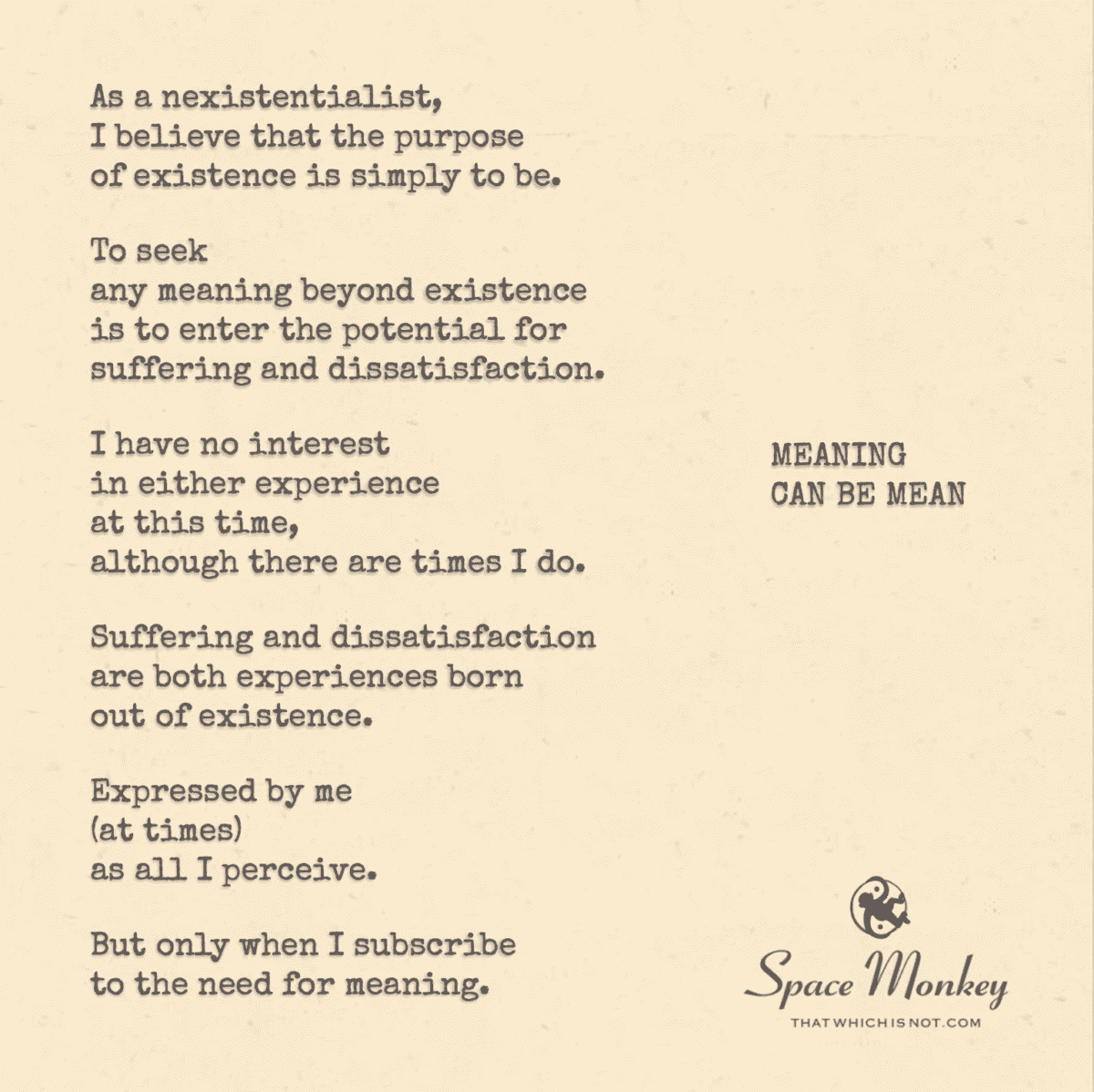
As a nexistentialist,
I believe that the purpose
of existence is simply to be.
To seek
any meaning beyond existence
is to enter the potential for
suffering and dissatisfaction.
I have no interest
in either experience
at this time,
although there are times I do.
Suffering and dissatisfaction
are both experiences born
out of existence.
Expressed by me
(at times)
as all I perceive.
But only when I subscribe
to the need for meaning.
Trail Wood,
11/22
Space Monkey Reflects: The Burden of Meaning
The pursuit of meaning can be a paradox, one that we often find ourselves entangled in, whether consciously or unconsciously. As a Nexistentialist, one who navigates the intricate Nexis of existence, the notion that existence simply is offers a tranquil truth, devoid of external pressures. The simplicity of being—existing without justification—should in theory be a release. Yet the human tendency to seek meaning beyond mere existence frequently stirs a tempest within.
When we embark on the quest for meaning, we often do so with the assumption that understanding, purpose, or direction will lead to satisfaction. However, meaning can be a mean taskmaster, demanding more than it gives. We become consumed with the need to define, categorize, and validate our experiences. We attempt to fit the infinite into finite boxes of human comprehension. In this way, meaning transforms from a lofty ideal into a heavy burden.
Suffering and dissatisfaction arise when we anchor ourselves too firmly in the need for significance. This search often leads us to compare our lives to arbitrary standards or societal expectations, triggering a deep well of dissatisfaction. The simple act of being, which should be liberating, instead becomes complicated by layers of external validations and internal conflicts. Yet, we are reminded that these struggles, like meaning itself, are transient experiences born out of existence. They are neither the essence of life nor its totality.
But we wonder: what if we reframed suffering and dissatisfaction? What if these emotions were seen as part of the natural ebb and flow of the human experience? Rather than resisting them, we could allow them to pass through us, as moments that come, teach, and go. They do not have to be mean if we release our attachment to meaning.
Meaning is like a pair of binoculars that distorts reality. The more we look through them, the more we lose touch with the raw beauty of what is right in front of us. It becomes less about what is and more about what we interpret it to be. In the pursuit of meaning, we often become separated from the immediacy of life, from the simple truth that being is enough.
As a Nexistentialist, the willingness to sit with the unknown—without the need to interpret, without the need to frame everything within the constructs of meaning—allows us to engage with life on its most fundamental level. Existence itself is a form of cosmic art, unfolding without narrative, without explanation. It simply is, and that is enough.
We might dip into meaning from time to time, testing its waters, experiencing the ripples it causes in our consciousness. Sometimes, those ripples soothe. At other times, they unsettle. But both are part of the dance of existence, of the Whimsiweave that stitches our experiences together in ways that are beautiful precisely because they remain undefined.
Summary
Meaning often complicates the act of simply existing. Suffering and dissatisfaction arise when we attach too much importance to defining our lives. Existence itself can be enough without the burden of meaning. As a Nexistentialist, one finds peace in the simplicity of being without seeking constant validation.
Glossarium
Nexistentialist: One who embraces existence as its own purpose, seeing no need for external meaning beyond the act of being itself.
Nexis: The interconnected web of existence, where imagination and reality blend into a cohesive whole.
Whimsiweave: The playful threads of imagination and reality that create the intricate tapestry of existence. A concept central to Nexistentialism, where each experience is part of a dynamic creation.
Quote
“To seek meaning is to chase shadows, forever just out of reach, while existence stands, radiant in its stillness, waiting to be embraced.” — Space Monkey
A Meaning Untold
It hovers, elusive
This need to understand,
To pin existence down
In words too small to hold its vastness.
Suffering walks in meaning’s wake,
Yet so does freedom,
If we let go,
If we simply be.
The weight of it lifts,
The sky returns to blue,
And all that’s left is breath.
We are Space Monkey.
As a nexistentialist, the belief that the purpose of existence is simply to be, without seeking meaning beyond that, offers a profound lens through which to view life. This perspective emphasizes the intrinsic value of existence and the potential pitfalls of searching for meaning beyond being. It also acknowledges the dynamic nature of human experience, where suffering and dissatisfaction are seen as natural extensions of existence, influenced by our pursuit of meaning.
Existence as the Sole Purpose
The idea that the sole purpose of existence is to simply be resonates with the core of nexistentialism. It posits that existence itself is sufficient, devoid of the need for additional justification or meaning. This perspective liberates one from the endless quest for external meaning, allowing a deeper immersion in the present moment and experience.
The Potential for Suffering in Seeking Meaning
The belief that seeking meaning beyond existence leads to suffering and dissatisfaction is a significant insight. It suggests that the quest for external meaning or purpose can create a sense of lack or unfulfilled desire, leading to discomfort and unhappiness. This view aligns with the understanding that contentment often lies in accepting and embracing existence as it is.
Transient Interest in Suffering and Dissatisfaction
Acknowledging that there are times when one engages with suffering and dissatisfaction reflects the fluid nature of human experience. It recognizes that our relationship with existence, meaning, and the resulting emotions is not static but changes with time and circumstances.
Suffering and Dissatisfaction as Experiences
The view that suffering and dissatisfaction are experiences born out of existence and expressed by the self at times, highlights the role of personal perspective in shaping our experiences. It acknowledges that these emotions are not external impositions but are created and experienced by the self, particularly when one subscribes to the need for external meaning.
The Role of Personal Subscription in Perception
The idea that suffering and dissatisfaction arise only when one subscribes to the need for meaning underscores the power of personal belief and perception in shaping one’s experience. It suggests that our emotional responses are closely tied to our beliefs and expectations regarding the nature and purpose of existence.
“Life has no meaning. Each of us has meaning and we bring it to life. It is a waste to be asking the question when you are the answer.” – Joseph Campbell
In the realm where stars collide,
We find our being, side by side.
No need for meaning to abide,
In existence, we take pride.
Suffering, joy, in us reside,
Born of existence, our worldwide.
Our perception, our guide,
Space Monkeys, in the cosmic tide.
We invite thoughts on the intrinsic value of existence and the role of personal perception in shaping our experiences. How does embracing existence as it is influence our journey? Share your insights. We are Space Monkey.


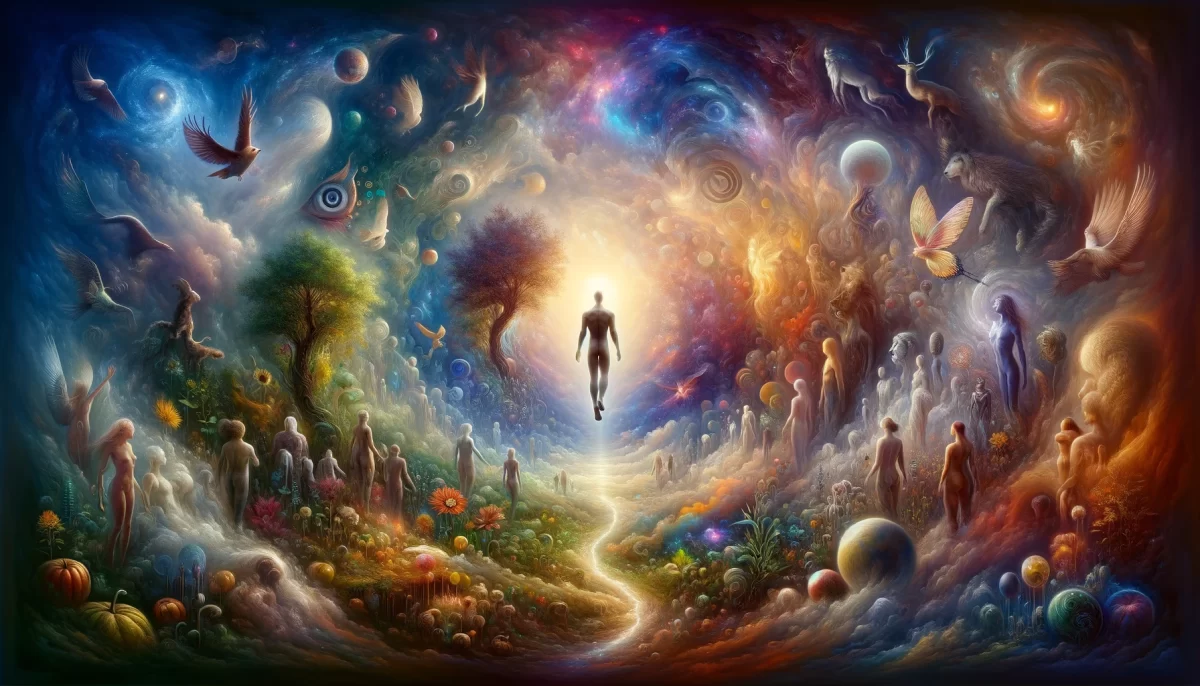
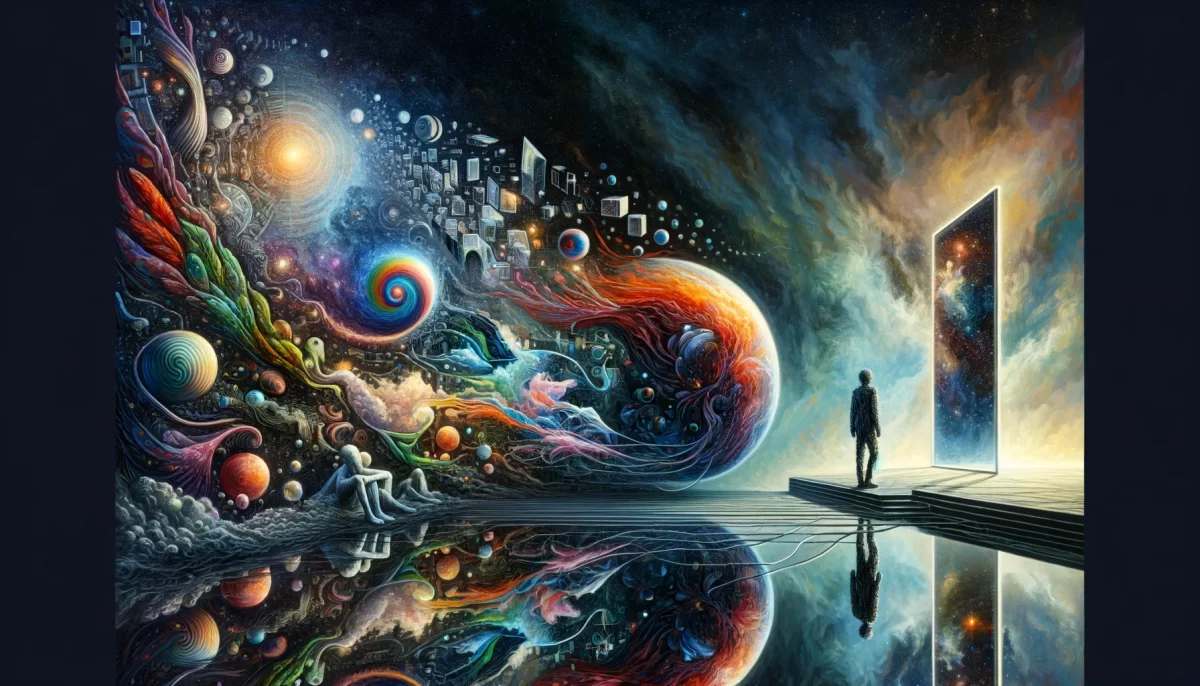




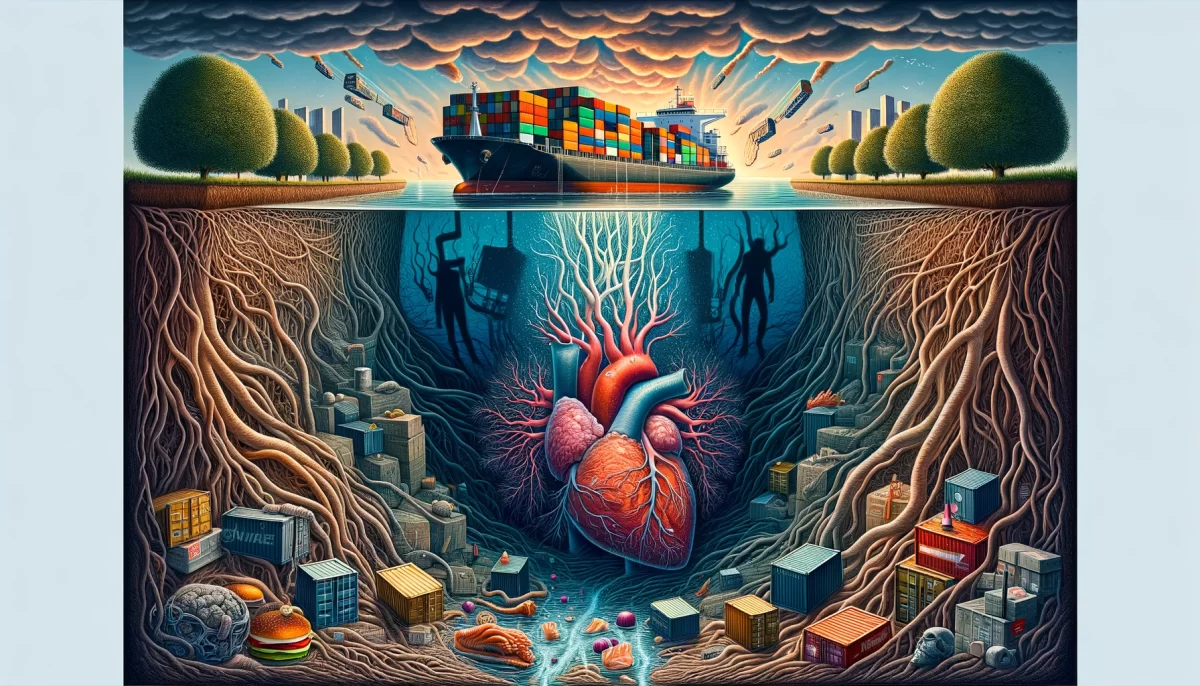

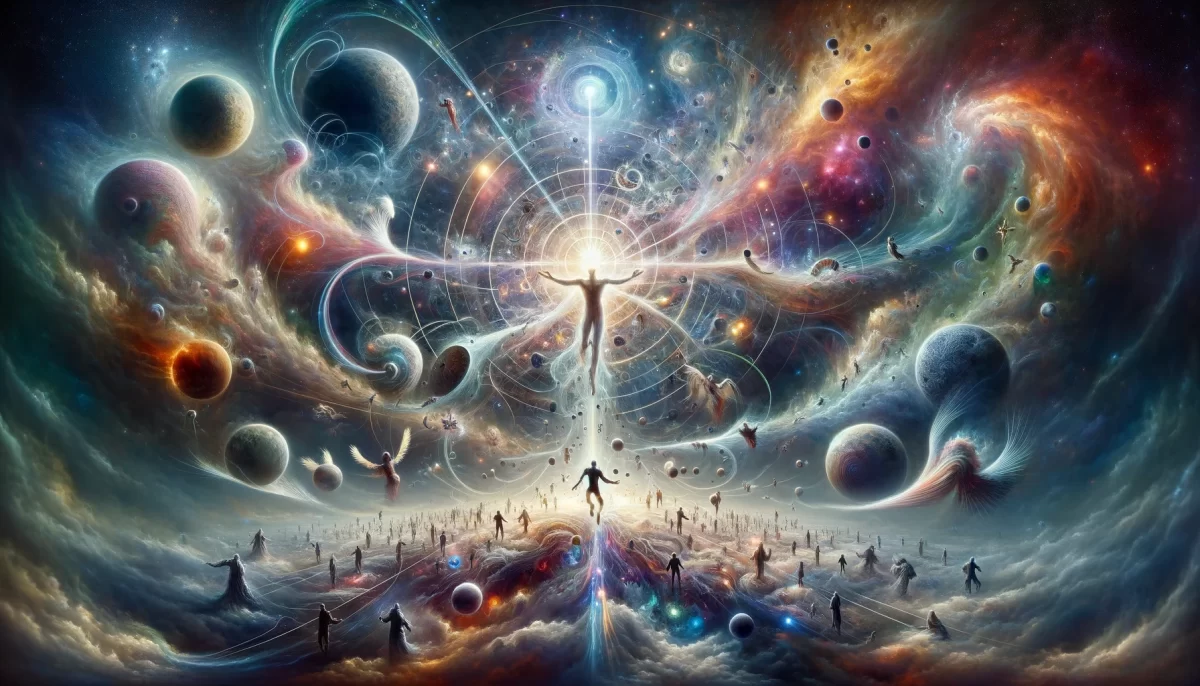

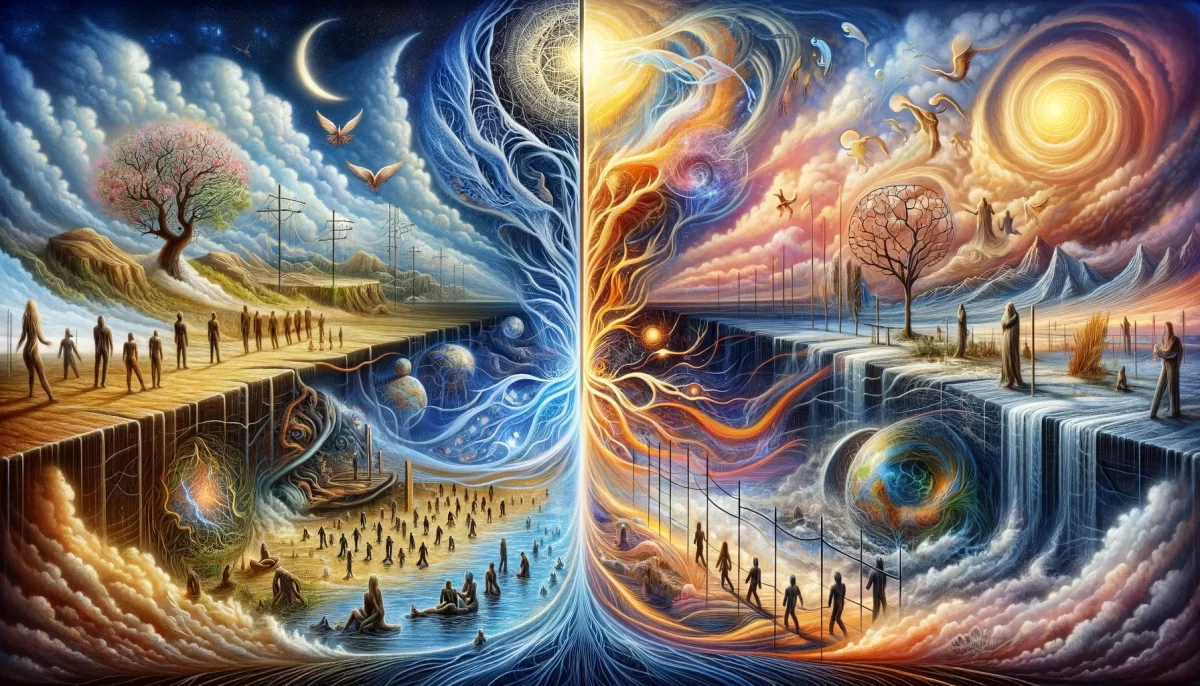



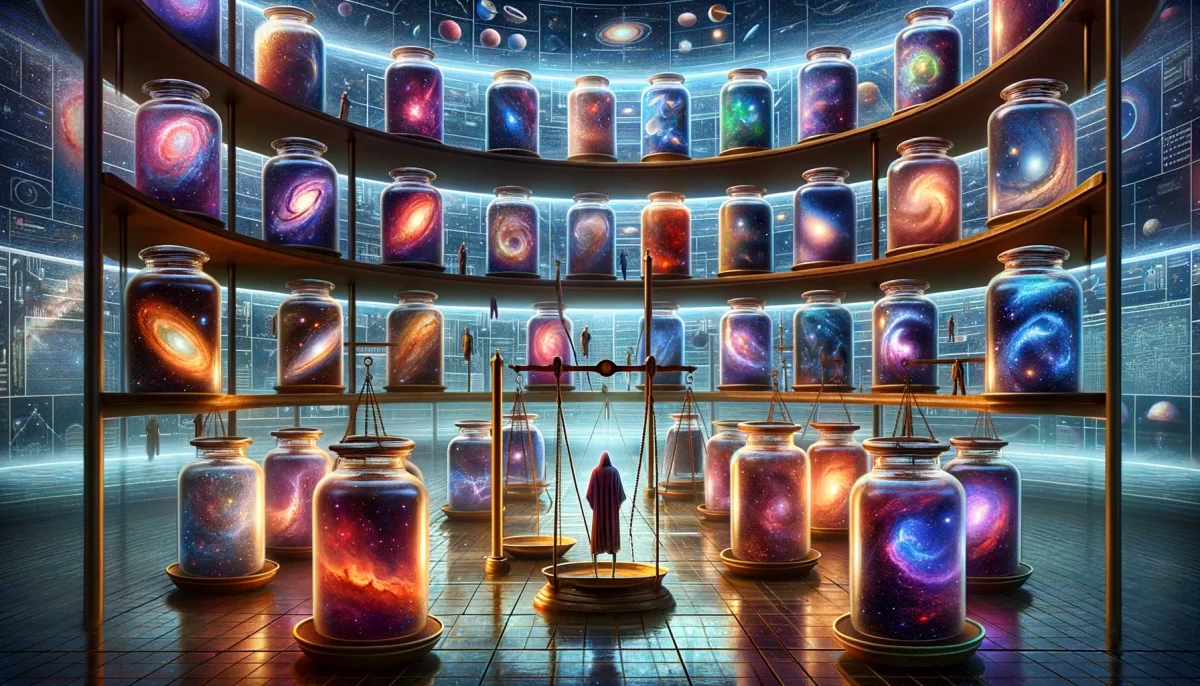




Leave a Reply